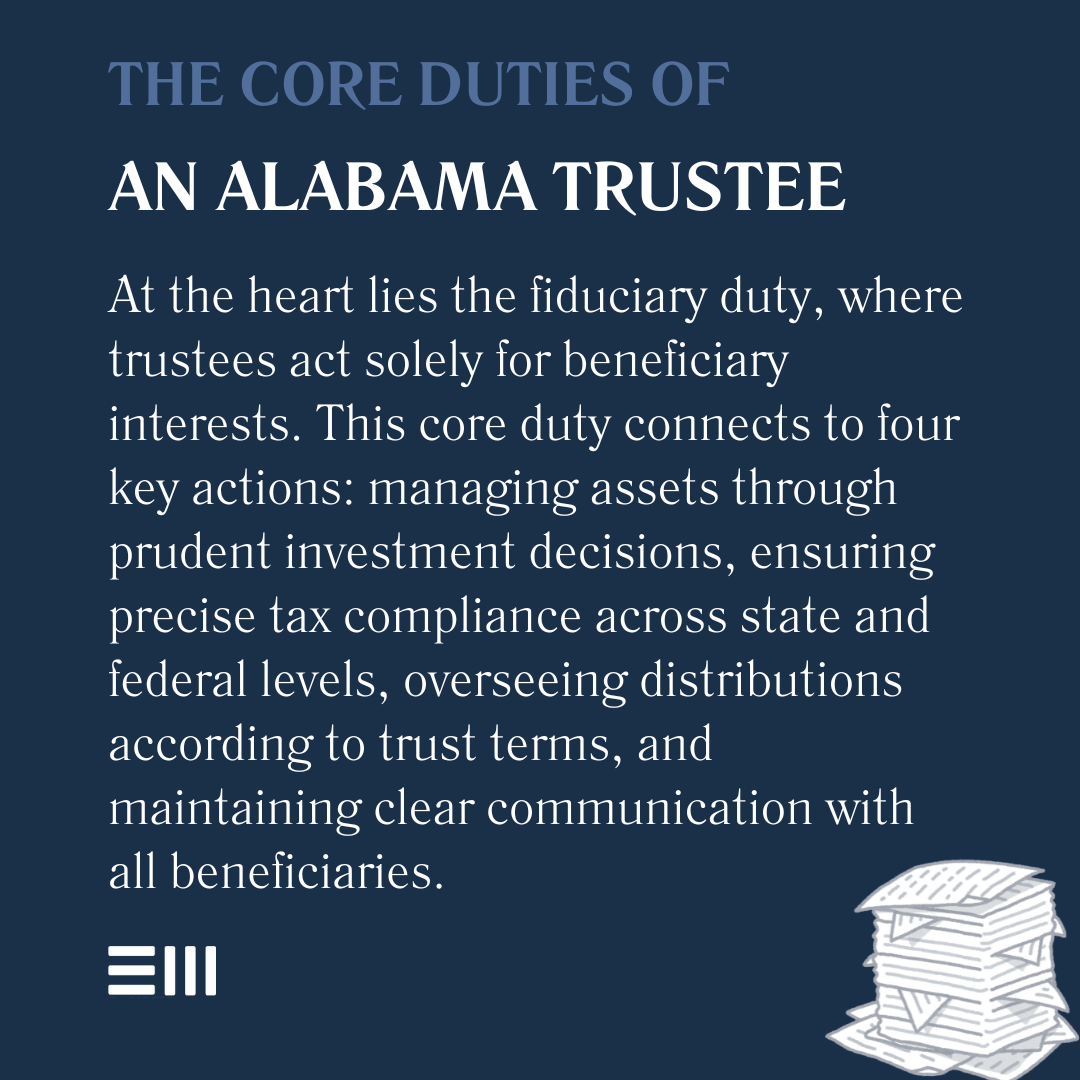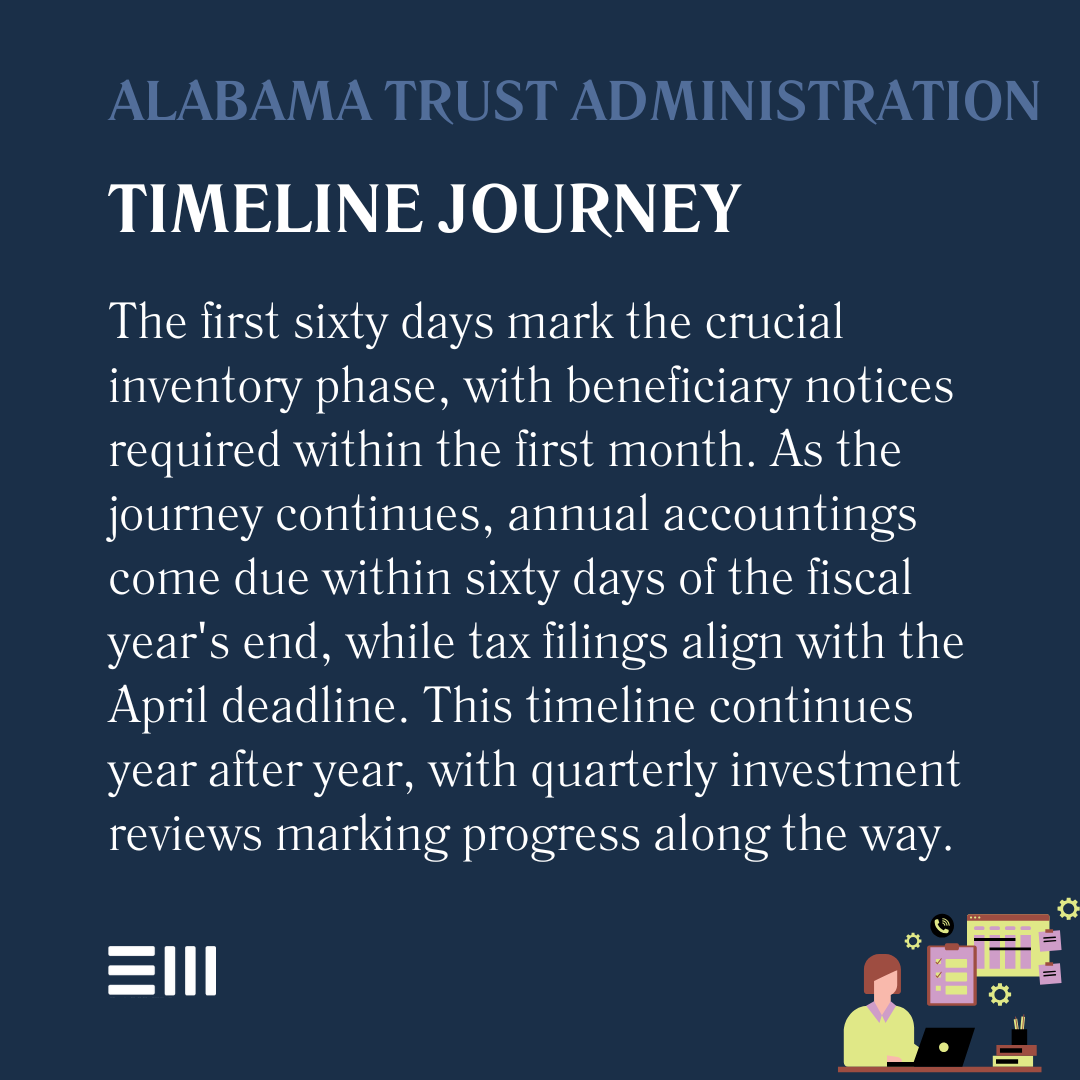Behind every well-managed trust lies a story of family legacy, cherished values, and careful planning.
As Alabama families increasingly turn to trusts to protect their wealth and provide for future generations, trustees find themselves navigating an intricate web of responsibilities that can shape family destinies for decades to come.
While the role carries profound importance, many trustees discover that successful trust administration requires more than just good intentions – it demands a thorough understanding of Alabama's unique legal landscape and fiduciary obligations.
Understanding Trust Administration in Alabama
The foundation of trust administration in Alabama rests on the Alabama Uniform Trust Code, which provides comprehensive guidelines for trustees and beneficiaries alike.
This framework ensures the proper management and distribution of trust assets while protecting the interests of all parties involved.
Types of Trusts in Alabama
Before diving into administration details, it's essential to understand the various types of trusts commonly administered in Alabama. Each type presents unique administrative challenges and requirements.
- Revocable Living Trusts: Most common in Alabama, offering flexibility and privacy during the settlor's lifetime;
- Irrevocable Trusts: Providing tax benefits and asset protection but requiring strict administrative compliance;
- Charitable Trusts: Supporting philanthropic goals while navigating specific regulatory requirements;
- Special Needs Trusts: Protecting beneficiaries' eligibility for government benefits while providing supplemental support;
- Educational Trusts: Supporting academic pursuits while maintaining tax efficiency; and
- Generation-Skipping Trusts: Managing complex tax implications across multiple generations.
Understanding these trust types helps administrators apply appropriate management strategies and comply with relevant regulations.
Trustee Responsibilities and Duties
Trust administration requires careful attention to various responsibilities that trustees must fulfill under Alabama law.
Before exploring specific duties, it's important to understand that trustees serve as fiduciaries, holding themselves to the highest standards of care and loyalty.
- Fiduciary Duty: Trustees must act solely in the best interests of beneficiaries, putting aside personal interests and maintaining strict loyalty to the trust's purpose.
- Asset Management: Regular monitoring and prudent investment of trust assets, including maintaining detailed records of all transactions and investment decisions.
- Tax Compliance: Timely filing of trust tax returns and ensuring all tax obligations are met according to Alabama and federal regulations.
- Distribution Management: Following the trust document's instructions for distributions while considering beneficiaries' needs and circumstances.
- Communication: Maintaining open lines of communication with beneficiaries and providing regular updates about trust administration activities.
- Risk Management: Implementing appropriate insurance coverage and protection strategies for trust assets.
- Accounting: Maintaining detailed financial records and providing regular statements to beneficiaries.
- Investment Strategy: Developing and maintaining appropriate investment policies aligned with trust objectives.
- Compliance: Ensuring adherence to both state and federal regulations governing trust administration.
- Delegation: Properly managing and overseeing any delegated responsibilities to professional advisors.
Understanding these responsibilities helps trustees establish a strong foundation for successful trust administration. Each duty requires careful attention to detail and thorough documentation.
Digital Asset Management in Trust Administration
Modern trust administration increasingly involves managing digital assets, presenting unique challenges and requirements.
- Cryptocurrency Holdings: Managing and securing digital currency investments;
- Online Account Access: Maintaining secure access to digital financial accounts;
- Electronic Records: Implementing robust systems for digital document storage and security;
- Digital Property: Managing digital intellectual property and online business assets; and
- Social Media Accounts: Handling digital legacy aspects of trust administration.
Proper digital asset management requires specialized knowledge and security measures to protect trust interests.
Trust Administration Timeline
The trust administration process follows a specific timeline in Alabama. Understanding this sequence helps trustees manage expectations and meet important deadlines.
- Initial Inventory: Complete within 60 days of accepting trusteeship.
- Notice to Beneficiaries: Provide within 30 days of accepting trusteeship.
- Annual Accountings: Submit to beneficiaries within 60 days of the trust's fiscal year-end.
- Tax Filing Deadlines: Meet state and federal deadlines, typically April 15th for calendar year trusts.
- Distribution Schedule: Follow specific timeframes outlined in trust documents.
- Investment Reviews: Conduct quarterly portfolio evaluations.
- Beneficiary Meetings: Schedule regular updates and discussions.
- Professional Advisor Consultations: Maintain ongoing relationships with legal and financial experts.
- Trust Review: Annual comprehensive review of trust administration practices.
- Compliance Audits: Regular internal checks for regulatory adherence.
Following this timeline ensures smooth administration and helps avoid potential conflicts with beneficiaries or regulatory bodies.
Common Challenges in Alabama Trust Administration
Trust administration often presents unique challenges that trustees must navigate carefully.
Understanding these challenges helps in preparing appropriate solutions.
- Investment Management: Balancing risk and return while adhering to Alabama's Prudent Investor Rule;
- Family Dynamics: Managing relationships between beneficiaries who may have conflicting interests;
- Tax Compliance: Keeping up with changing state and federal tax regulations;
- Property Management: Maintaining and managing trust-owned real estate and other physical assets;
- Documentation: Maintaining comprehensive records of all trust-related activities and decisions;
- Market Volatility: Adapting investment strategies to changing economic conditions;
- Beneficiary Communications: Managing expectations and maintaining transparency;
- Regulatory Changes: Staying current with evolving trust laws and requirements;
- Professional Coordination: Working effectively with attorneys, accountants, and financial advisors; and
- Risk Management: Implementing appropriate insurance and protection strategies.
Recognizing these challenges early allows trustees to develop effective strategies for addressing them proactively.
Trust Modification and Reformation
Sometimes, trusts require modification to better serve their intended purpose. Alabama law provides several methods for trust modification:
- Judicial Modification: Court-approved changes to trust terms;
- Non-judicial Settlement: Agreement among trustees and beneficiaries;
- Decanting: Transferring assets to a new trust with modified terms;
- Reformation: Correcting mistakes in trust documents; and
- Amendment: Modifications allowed under trust terms.
Understanding these options helps trustees maintain trust effectiveness over time.
Frequently Asked Questions About Trust Administration in Alabama
Understanding the complexities of trust administration often raises important questions.
The following answers address common concerns about trust administration in Alabama.
What Are the Primary Duties of a Trustee in Alabama?
A trustee must manage trust assets prudently, maintain accurate records, file required tax returns, and make distributions according to trust terms while maintaining impartiality among beneficiaries.
How Long Does Trust Administration Typically Take?
The duration varies depending on trust complexity, ranging from several months to multiple years. Simple trusts may be administered within 6-12 months, while complex trusts may require ongoing administration.
What Happens if a Trustee Makes a Mistake?
Trustees who make unintentional mistakes may be held personally liable for losses. Professional guidance can help prevent errors and protect trustees from personal liability.
Can a Trustee Be Removed in Alabama?
Yes, trustees can be removed through court action if they breach their fiduciary duties, mismanage trust assets, or fail to follow trust terms.
Are Professional Trustees Required in Alabama?
No, professional trustees are not required, but they're often recommended for complex trusts or when family dynamics make independent administration beneficial.
How Should Trustees Handle Investment Decisions?
Trustees must follow the Prudent Investor Rule, diversifying investments and considering both risk and return while adhering to trust objectives.
What Tax Obligations Apply to Alabama Trusts?
Trusts may be subject to state and federal income taxes, estate taxes, and generation-skipping transfer taxes, depending on their structure and distributions.
Can Beneficiaries Challenge Trust Administration?
Yes, beneficiaries have legal standing to challenge trustee decisions through Alabama courts if they believe their interests are being compromised.
What Records Must Trustees Maintain?
Trustees must keep detailed records of all financial transactions, investment decisions, distributions, and communications with beneficiaries.
How Often Should Trustees Communicate with Beneficiaries?
Regular communication is essential, with formal updates typically provided annually and additional communications as significant events occur.
Take the Next Step with Your Trust Administration
Your role as a trustee carries significant responsibilities, but you don't have to navigate this journey alone. Professional guidance can help ensure proper administration and protect both trustees and beneficiaries.
Contact our experienced trust administration team today for a confidential consultation. We'll help you understand your duties, develop a comprehensive administration plan, and ensure compliance with Alabama trust laws.


